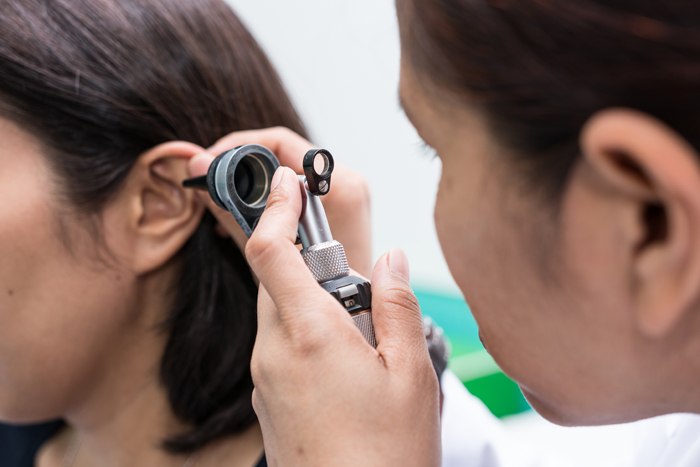Ear Infection Treatment in Tardeo, Mumbai
Although ear infections are a more common occurrence in children, adults are also susceptible to them. These infections are often mild in childhood, recovering early. In adulthood, however, they can develop severe symptoms and might become hard to treat.

What Is an Ear Infection?
Ear infections are bacterial or viral infections occurring inside the ear. The air-filled spaces behind the eardrum in the middle ear swell up and get blocked due to the infection.
These infections may be acute or chronic. Acute ear infections can give rise to painful symptoms but also get cured after a short duration. Chronic ear infections persist longer or recur; they can cause permanent damage to the eardrums and severely affect your hearing ability.
What Are the Symptoms of an Ear Infection?
You can develop an ear infection in only one or both ears. The following symptoms are typical for in-ear infections:
- Pain or discomfort in the ear
- A pressing feeling within the ear
- Pus-like or watery drainage from the ear
- Reduced hearing
Other than the above symptoms, children can also develop these signs and symptoms:
- Ear pain causing them to pull their ear constantly
- Increased crankiness and trouble falling asleep
- Trouble responding to sounds
- Reduced balance and frequent falls
- High fever
- Fluid drainage from the ear
- Headache
- Loss of appetite
If the symptoms persist for more than a day, you should consult a medical professional for accurate diagnosis and prompt treatment.
Request an appointment at Apollo Spectra Hospitals, Tardeo, Mumbai
Call 1860 500 2244 to book an appointment
What Causes an Ear Infection?
The air-filled tubes behind the eardrum become swollen and blocked. It causes fluid to build up in your middle ear.
The causes for this blockage include:
- Sinus infections
- Common cold or flu
- Allergies
- Excessive mucus
- Tonsilitis due to bacterial or viral infection
Am I at Risk of an Ear Infection?
Children are more prone to ear infections. Bottle-fed infants are more likely to develop these infections compared to breast-fed infants.
- In adults, you are at risk of ear infections if you have:
- Recent illness or any other throat or sinus infection
- Exposed to rapid climatic and altitude changes
- Exposure to pollutants
How Are Ear Infections Diagnosed?
The best way to diagnose abnormalities of the eardrum is through otoscopy. In this procedure, your doctor will insert a thin scope through your ear. The otoscope contains a light magnifying lens to help visualise any inflammatory signs and eardrum perforations.
If your infection is advanced, your doctor may take a sample of the fluid inside your ear. Examining this fluid sample can determine the presence of certain types of antibiotic-resistant bacteria. It will help your doctors plan further treatment.
Your doctors may also prescribe a CT scan of your head - to determine the spread of the infection. An audiometry test to ascertain your hearing loss may be necessary, especially if you have chronic, recurring ear infections.
What Are the Treatment Options Available for an Ear Infection?
Since most ear infections cure on their own, the treatment involves symptomatic management. Medications or ear drops for relieving pain and decongestants are often sufficient for treating the symptoms.
If these treating options are not helping with your ear infections, your doctor may prescribe antibiotics to reduce bacterial infections. Chronic and recurring ear infections often need antibiotics.
Ear tubes may be necessary if you have a chronic infection or a continuous build-up of fluid in your ear. These tubes will drain out the fluid from the ear and prevent bacterial growth.
Conclusion
Prompt treatment for your ear infection can reduce the risk of complications. Letting an ear infection persist for too long without treatment can put you at risk of permanent hearing loss and possibly having this infection spread to surrounding tissues in your head.
Ear infections often give rise to sharp pain in the ear. You can also get a feeling of fullness in the ear, muffling any sounds you hear. In advanced ear infections, there may also be fluid discharge from your ear.
Most ear infections resolve within 3-4 days. Chronic ear infections may last longer, in some cases even six weeks or more.
Ear infections can cause mild hearing loss that gets better as the infection is treated. If there is a recurrence of this infection or fluid accumulation in the middle ear, it can lead to significant hearing loss. Permanent damage to the eardrum (like eardrum perforations) can result in permanent hearing loss.
Symptoms
Our Doctors
DR. JAYESH RANAWAT
MBBS, MS, DNB, FCPS...
| Experience | : | 16 Yeras Experience |
|---|---|---|
| Speciality | : | ENT, Head and Neck S... | Location | : | Tardeo |
| Timings | : | Available by prior a... |
DR. NINAD SHARAD MULEY
BDS, MDS...
| Experience | : | 9 Yeras Experience |
|---|---|---|
| Speciality | : | Dental and Maxillofa... | Location | : | Chembur |
| Timings | : | Mon - Sat : 9:00 AM ... |
DR. DIPAK DESAI
MBBS, MS, DORL...
| Experience | : | 21 Yeras Experience |
|---|---|---|
| Speciality | : | ENT, Head and Neck S... | Location | : | Tardeo |
| Timings | : | Available by prior a... |
DR. RINAL MODI
BDS...
| Experience | : | 8 Yeras Experience |
|---|---|---|
| Speciality | : | Dental and Maxillofa... | Location | : | Tardeo |
| Timings | : | Mon - Sat : 10:00 AM... |
DR. PRASHANT KEWLE
MS (ENT), DORL...
| Experience | : | 17 Yeras Experience |
|---|---|---|
| Speciality | : | ENT, Head and Neck S... | Location | : | Chembur |
| Timings | : | Mon - Sat : 4:00 PM ... |
DR. KEYUR SHETH
DNB (Med), DNB (Gast...
| Experience | : | 7 Yeras Experience |
|---|---|---|
| Speciality | : | Gastroenterology... | Location | : | Chembur |
| Timings | : | Mon to Fri : 2:00 PM... |
DR. MEENA GAIKWAD
MBBS, MS (ENT)...
| Experience | : | 8 Yeras Experience |
|---|---|---|
| Speciality | : | ENT, Head and Neck S... | Location | : | Chembur |
| Timings | : | Mon - Sat : 6:30 PM ... |
DR. SHRUTI SHARMA
MBBS,MS(ENT)...
| Experience | : | 15 Yeras Experience |
|---|---|---|
| Speciality | : | ENT, Head and Neck S... | Location | : | Tardeo |
| Timings | : | "Mon - Fri : 11:00 A... |
DR. YASH DEVCKAR
MBBS, MS (ENT)...
| Experience | : | 11 Yeras Experience |
|---|---|---|
| Speciality | : | ENT, Head and Neck S... | Location | : | Chembur |
| Timings | : | Mon - Sat : 9:30 AM ... |
DR. ROSHNI NAMBIAR
MBBS, DNB (ENT)...
| Experience | : | 19 Yeras Experience |
|---|---|---|
| Speciality | : | ENT, Head and Neck S... | Location | : | Chembur |
| Timings | : | Mon - Sat : 12:30 PM... |
DR. SHASHIKANT MHASHAL
MBBS, MS (ENT)...
| Experience | : | 22 Yeras Experience |
|---|---|---|
| Speciality | : | ENT, Head and Neck S... | Location | : | Chembur |
| Timings | : | Friday : 8:00 PM to ... |
DR. ANKIT JAIN
MBBS, MS (ENT)...
| Experience | : | 14 Yeras Experience |
|---|---|---|
| Speciality | : | ENT, Head and Neck S... | Location | : | Tardeo |
| Timings | : | Mon, Wed, Fri : 4:00... |
DR. MITUL BHATT
MBBS, MS (ENT), DNB ...
| Experience | : | 12 Yeras Experience |
|---|---|---|
| Speciality | : | ENT, Head and Neck S... | Location | : | Tardeo |
| Timings | : | Mon - Sat : 2:30 PM ... |
DR. GANGA KUDVA
MBBS, MS (ENT) , DNB...
| Experience | : | 12 Yeras Experience |
|---|---|---|
| Speciality | : | ENT, Head and Neck S... | Location | : | Tardeo |
| Timings | : | Available by prior a... |
Our Top Specialities
NOTICE BOARD
CONTACT US
CONTACT US
 Book Appointment
Book Appointment



.jpg)












.svg)
.svg)
.svg)
.svg)








